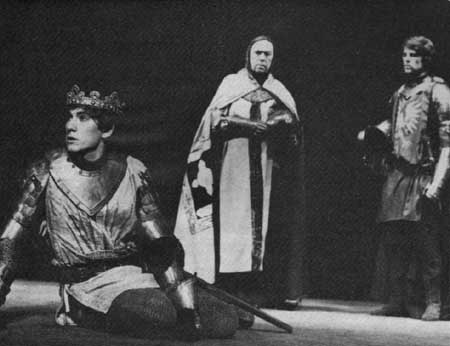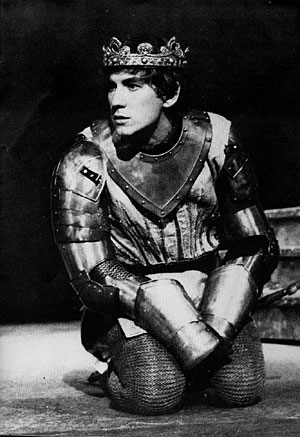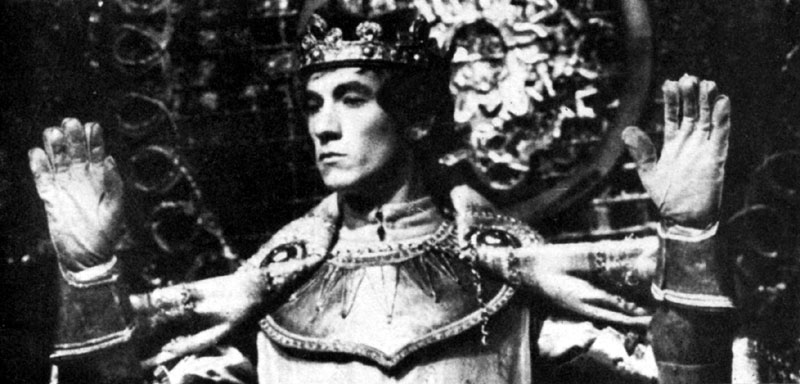by William Shakespeare

Words from
Ian McKellen
Richard Cottrell, perhaps more than anyone else, was responsible for my
becoming a professional actor. After a couple of good reviews for an
undergraduate production of Shakespeare’s Henry 4th part 2 (with me as
Justice Shallow), Richard said “I suppose this means you will be getting an
agent soon” — a move that I had not contemplated before, although friends at
Cambridge, like Richard, already had their sights set on show business.
Six years later, as a director of the touring Prospect Theatre, Cottrell
invited me to play King Richard 2 for a five week tour of English regional
theatres. I was somewhat daunted, having acted in only two Shakespeares in my
five years since university, but this offer was a trusting confirmation that my
career was going well and, with Richard’s friendly guidance, I thought I might be
up to the challenge. We arranged for him to come over in the summer of 1968 to
plan the production in Ireland, where I was filming
Alfred the Great. How grown-up
this felt.
|

Richard 2
|
 Richard 2 Richard 2
|
I had pored over the text a couple of times before his arrival in
County Galway and had been struck by two things: that Richard 2 is a family saga –
cousins, uncles, aunts, spouses – and that Richard’s initial belief in his own
invulnerability (a god on earth) separates him out from his relatives and his
courtiers so that his growing self-awareness turns him toward the frailty of the
common human condition. Over the kitchen table in a converted railway station
above a carpet factory, Cottrell concurred and allowed me to make a number of
staging suggestions.
Prospect Theatre was an impecunious outfit – low salaries, simple settings –
but had a formidable reputation for no nonsense, clearly-spoken productions of
classical plays. It was founded in 1961 by Elizabeth Sweeting (manager of the
Oxford Playhouse) and by Iain Mackintosh, who was later successful as renovator
and designer of theatre interiors. By the time I joined them, Toby Robertson
(another Cambridge graduate) was in charge. Had I not also been to Cambridge, it
is most unlikely that I should have been thought reliable enough by Robertson
and Cottrell to play such a leading role in their Company.
|
|
It was a great relief to feel the support of fellow actors during rehearsals
who deferred to my opinions in a way I hadn’t experienced before. Perhaps they
saw I was facing a massive challenge and didn’t want to get in the way. Perhaps Richard and I were just very clear about our joint intentions. I was
soon feeling a self-confidence which I hadn’t known before. In performance, I
suspect on reflection, that I may have been a little over-bearing to the
rest of the cast! I certainly recall whispering to minor lords to “get a move
on” in what Gwen Ffrangcon Davies once called “the pause while I’m not speaking”.
|

“How some have been deposed, some slain in war...” (III.2.157)
Richard 2 with his faithful supporters Bishop of Carlisle & Earl of Salisbury.
|

Richard 2 (III.2)
|
Richard has a lot to say for himself, and the language of early Shakespeare is
easy to speak – the rhythms of the blank verse are regular and the vocabulary
simple. Its formality is well-suited to the ceremonial structure of much of the
action. My experience under George Rylands for the Marlowe Society at Cambridge
was paying off. No one had to teach me about end-stops and iambic pentameters.
My major support onstage was from the icily calm Neil Stacy as Bolingbroke and
the ex-Stratford veteran Paul Hardwick booming and weeping as his father. In
Brighton, in the pub next door to the Theatre Royal’s stagedoor, we celebrated
Paul’s 50th birthday. I thought, aged 29, how amazing to still be acting at his
age.

"Therefore we banish you our territories." (I.3.139)
Paul Hardwick (Gaunt), Ian McKellen (Richard 2), Andrew
Crawford (Bishop), Stephen Greif (Mowbray), Robert Eddison (York)
Photo by: John Gilbert
|
|
There was a flight of moveable stairs on the set and little else, so Tim
Goodchild could spend the bulk of his meagre budget on the costumes. There was
plenty of room for regal processing and marching and as Richard’s decline set
in, for kneeling and crawling. By his last scene in prison, Richard padded along
the sides of a square like a polar bear I’d seen at London zoo, lunatic with
boredom and constriction. Richard is now more man than god/king and, as history
reports, I tackled my murderers with manly vigour.
How, before that, to play a man who knows he is divine? It is, of course, up to
the other actors to help in the way they bow scrape and behave in the presence
of holiness. I discovered that holding both hands up in blessing as I slowly
entered for the first time in gold and glitter established an aura of
invincibility. A Cambridge friend, Gabor Cossa (an ex-dancer) suggested I glide
rather than stride under my bejewelled gown. I recalled the way drag supremacist
Danny La Rue flounced about in his frocks and I borrowed his roller-skating gait.
|

Timothy Goodchild’s costume design for Richard 2’s heavy ceremonial gown, glittered with gold paint, golden thread and some metallic milk-bottle tops.

"We were not born to sue, but to command" (I.2.196)
|

Piccadilly Circus, 1970
|
But appearance and presentation aren’t enough and I needed to really
believe that an audience in 1968 could accept Richard’s “divinity,” and
therefore what makes the title of Tragedy credible – his acceptance of his own
humanity at just the point when his murderers arrive. Then I thought of the
Dalai Lama, who was accepted in Tibet as a divine incarnation, yet not by the
invading forces from China, which led to his exile. Wasn’t he perhaps a modern
Richard, without the tragedy, let’s hope? Anyway, I took encouragement that
there was in the 20th century a living god who was also a suffering man. So the
play was lifted out of mediaeval into our own times. This was not, however, a
modern dress production. I found further confirmation that Richard’s fate had a
modern relevance — in Hollywood, a city littered with the corpses of stars who
were treated as superhuman and could not cope with the strain. Marilyn Monroe,
perhaps, or Elvis Presley who was, of course, known as “The King”.
So I played Richard as a star, out of touch with reality and desperate
eventually for friends whom he had not had when the play starts.
Cottrell’s production was speedy and well-organised around the leading
role. The story was clear and our audiences responded well.
Ian
McKellen, London, May 2003
|